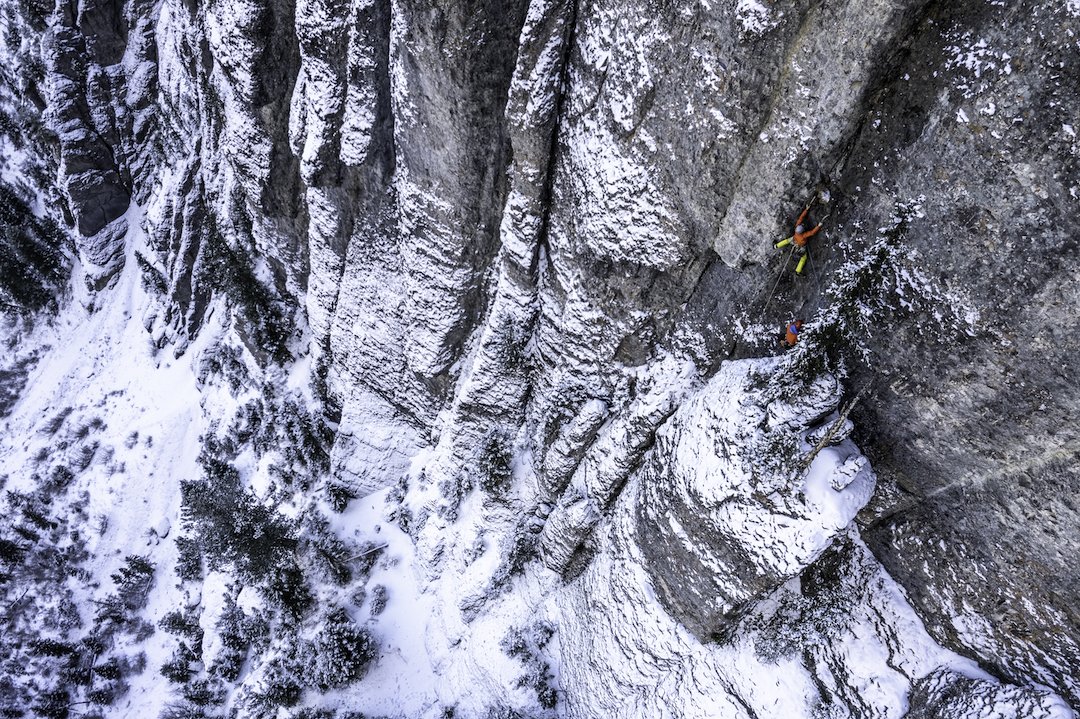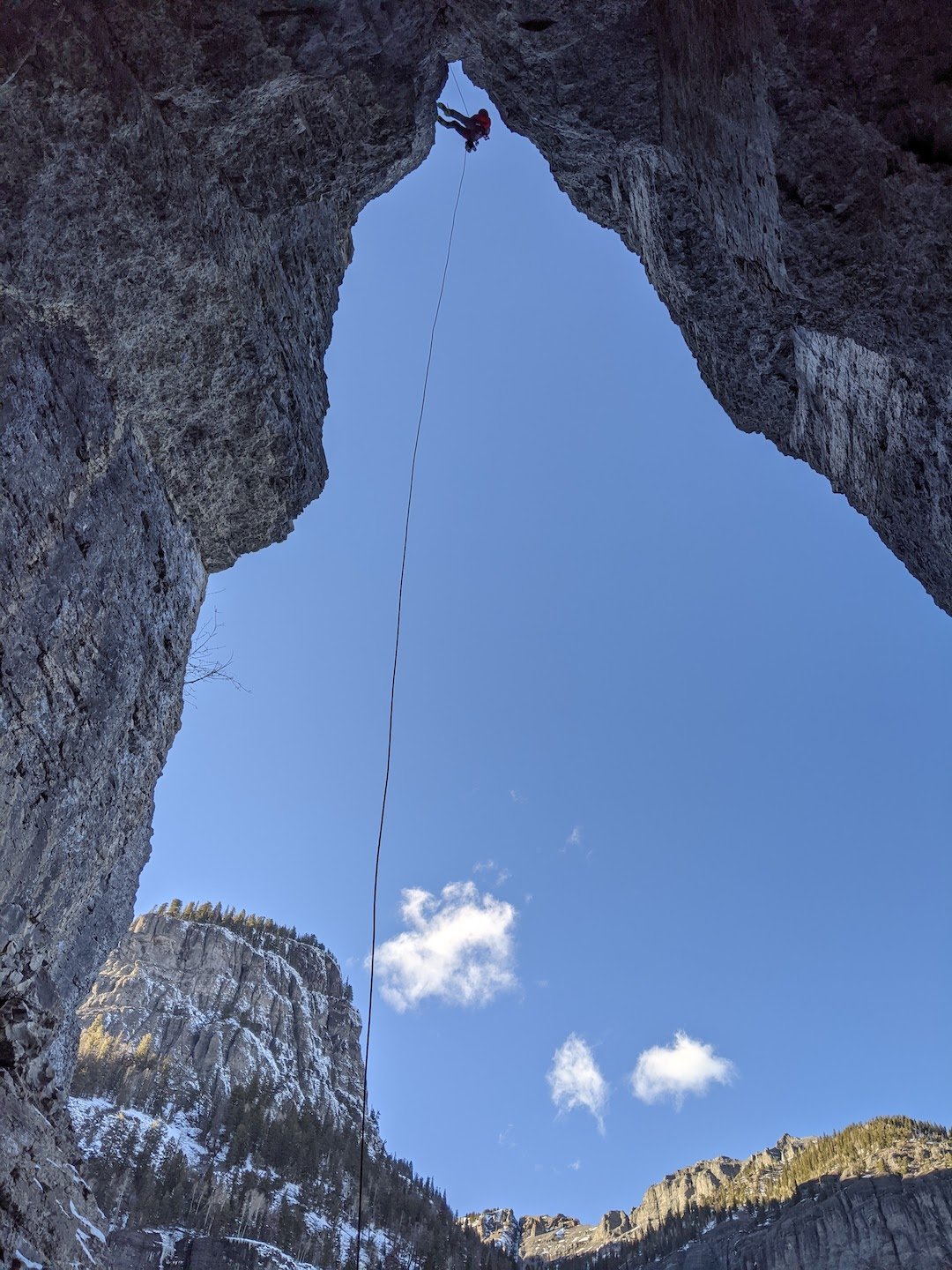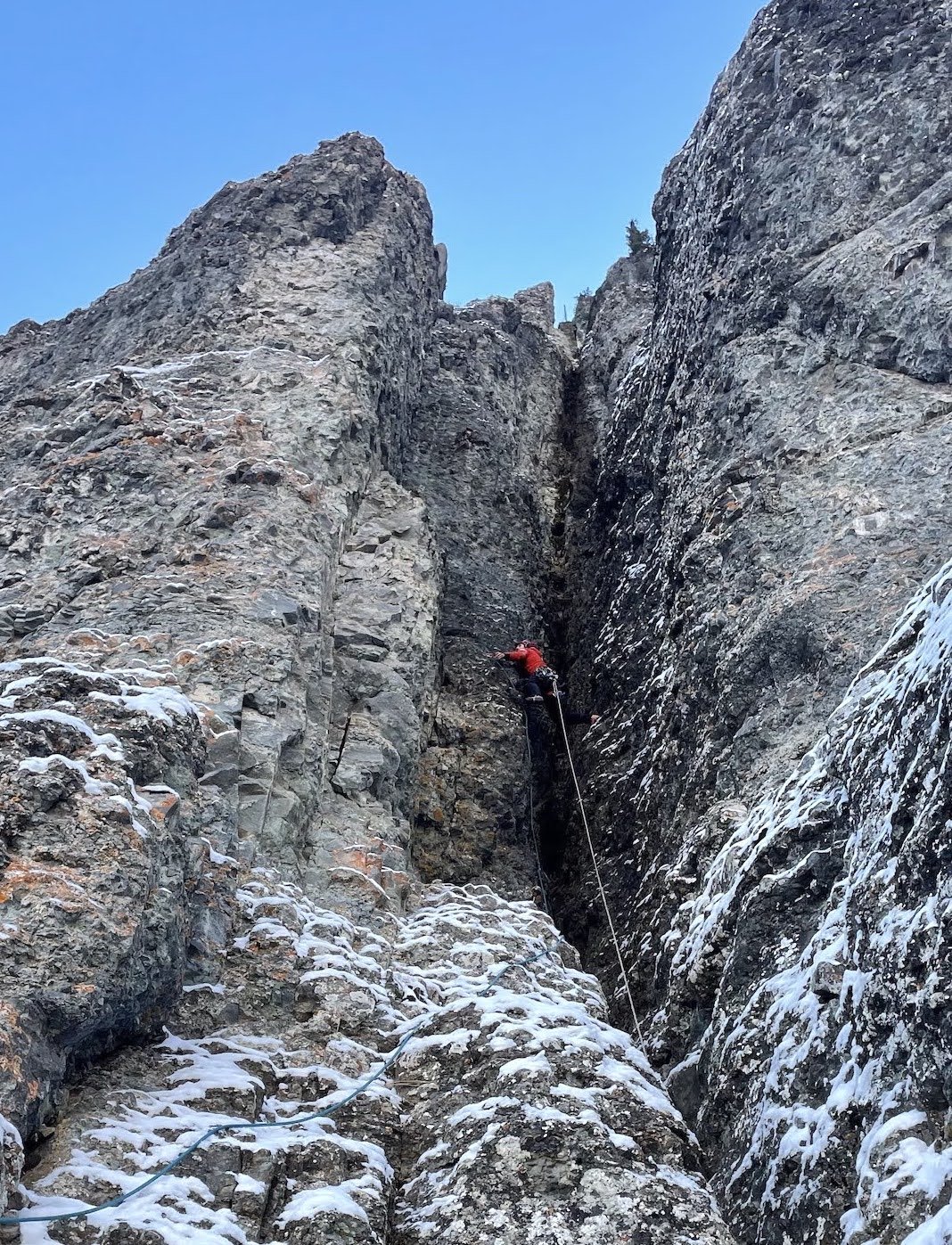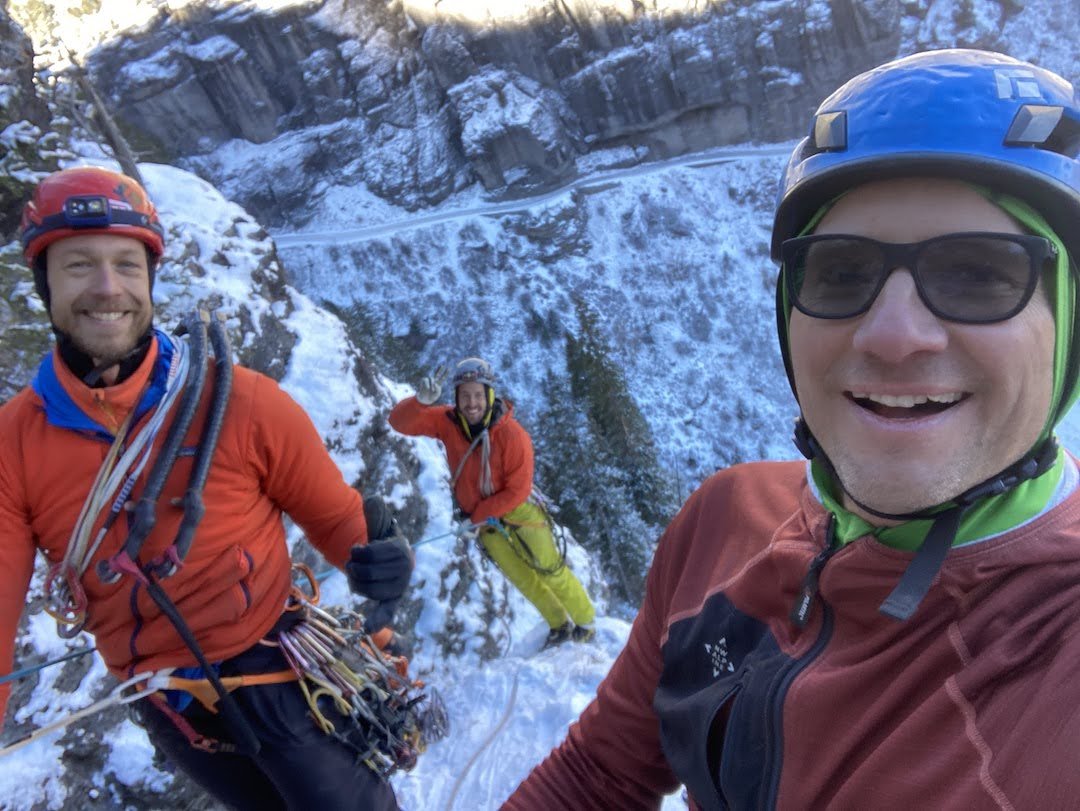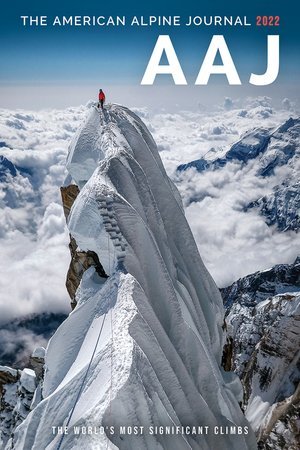The Line is the monthly newsletter of the American Alpine Journal.
FRESHIES
The editors of the American Alpine Journal (AAJ) are hard at work on the 2023 edition, and many new reports already are available online. Here’s a sampling of completed reports for next year’s book, from Nepal to New Hampshire to Greenland.
On the south ridge of Dolma Kang, just before the first bivouac. Photo by Tomeu Rubí.
Dolma Kang, Nepal Spanish climbers Pep Roig and Tomeu Rubí capped a visit to the Rolwaling Valley, west of the Khumbu, with a partial new route—and first alpine-style ascent—on the spectacular southeast face of Dolma Kang (6,332m). The ascent of their 1,400-meter route took two days, with part of another day to complete a safe descent.
Jon Nicolodi attempting the crux M10 pitch of The Resistance in Huntington Ravine, Mt. Washington, in February 2022. He finished the route a month later. Photo by Adam Bidwell.
The Resistance, Mt. Washington, New Hampshire In March, after attempts during two prior seasons, Jon Nicolodi redpointed the hardest route on the highest peak in the northeastern United States, freeing an old aid line on Pinnacle Buttress in Mt. Washington’s Huntington Ravine. The route includes three hard mixed pitches, with the crux roof (M10) spanning three body lengths, split by a crack that widens to offwidth near the lip.
Descending Peak 1,270m above Poulsen Fjord, with Umiak Peak in the background. Photo by Graham Tourell.
Poulsen Fjord, Greenland During July and August, a six-member team led by alpine guide Tim Blakemore (U.K./France), climbed in various locations along East Greenland’s rugged coast, based on the yacht Umiak. The highlight was their stay in Poulsen Fjord, where members of the team climbed four routes, likely all first ascents, including Umiak Peak, which rises nearly a mile above sea level at the head of the fjord.
The deadline for submissions to the 2023 AAJ is coming up fast. For more information or to send a report about your new route or mountain exploration, email us or visit this page.
PHOTO GALLERY: DROP THE MIC
Exactly a year ago, Noah McKelvin, Scott Turpin, and Phil Wortmann completed Drop the Mic (V 5.11- M8 R), a 1,400-foot route above Ouray, Colorado, near the popular short climbs along Camp Bird Mine Road. Efforts to establish the 10-pitch climb date back to 2018, with nine days of work in all. The result just might be the longest and most sustained mixed climb of this difficulty in the Lower 48. In his AAJ report, Turpin wrote, “We chose the difficult line at each turn, challenging ourselves to connect features the way we had envisioned from the ground. We bolted where necessary, placed lots of dubious gear, and punched it when there was no other option.” Special thanks to Jason Nelson (Visual Adventures) for sharing the great drone shot above; all other photos in this slide show are by the team.
Mini-Epic: The Bull River Prowler
Earl Lunceford climbed two long new routes up the north face of A Peak in Montana’s Cabinet Mountains last spring, the first of them solo. Alone on the summit without a rope, as he writes in his AAJ report, “I struggled to locate a safe path down…and opted to post-hole nine miles out to Highway 56, opposite from where I drove in. I emerged from the drainage of the North Fork of the Bull River at midnight and knocked on some doors to see if I could borrow a phone. A startled homeowner reported me to the police as a “prowler.” Soon afterward, a sheriff’s deputy responded and gave me a pleasant ride to the Lincoln County Sheriff’s Office in Libby, where my girlfriend graciously picked me up at 4 a.m.” The new route is called The Bull River Prowler (2,200’, AI4 M4).
Shop the AAJ Collection
Forgotten Mountaineer: Author’s Note
The 2022 American Alpine Journal published a short historical article about Dr. Cora Johnstone Best, an American mountaineer who was active in the Canadian Rockies and other ranges during the 1920s and gave popular lectures about her climbs and travels. In October, about six months after the 2022 AAJ went to press, the author of this article, Cheryl Jacklin-Piraino, discovered troubling quotes attributed to Best in newspaper accounts of her lectures.
Jacklin-Piraino explains below:
During her lectures, Dr. Best apparently made various statements supporting eugenics, a movement that began in the 19th century and aimed to “improve” the human race through selective breeding, and she spoke of the "survival of the white race." She also made derogatory statements about people with impairments. I regret these significant remarks were not known to me before my article went to press, since they are integral to a full understanding of Best's character. Her racist and ableist statements, which appear to have waned later in her career, stand in contradiction to her position on the council of the Trail Riders of the Canadian Rockies, a group with an explicit anti-racist bylaw. Her apparently contradictory nature is also evident in her support of Jewish youth and Japanese alpinists at a time when both ethnicities faced discrimination, and in her support of Russian Dukhobor immigrants who were the target of assimilation efforts by the Canadian government. It is my hope that future research by myself and others will reveal the full implications of Dr. Best’s feminist and social activism juxtaposed against her racist views, and how her rhetoric may have impacted those inside and outside the climbing community.
Colin Haley on Cerro Chaltén
One of the Cutting Edge podcast’s most popular guests, Colin Haley, returned to the show to chat about his solo winter ascent of the Supercanaleta route on Cerro Chaltén (Fitz Roy) in Patagonia. Don’t miss it!
Join the Club—United We Climb.
Get the AAJ Sent to You Annually
Partner-level members receive The American Alpine Journal book every year. Documenting mountain exploration and the year’s most significant ascents through first-person reports and photos, it’s an essential historical record and a feast of inspiration.
Rescue & Medical Expense Coverage
Climbing can be a risky pursuit, but one worth the price of admission. Partner-level members and up receive $7,500 in rescue services and $5,000 in emergency medical expense coverage. Looking for deeper coverage? Sign up for the Leader level and receive $300k in rescue services.
Sign Up for AAC Emails
The Line is the newsletter of the American Alpine Journal (AAJ), emailed to more than 80,000 climbers each month. Find the archive of past editions here. Interested in supporting this online publication? Contact Billy Dixon for opportunities. Suggestions? Email us: aaj@americanalpineclub.org.





